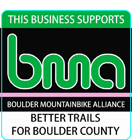Mountain biking allowed on more trails in Boulder
/
This article was in the Wednesday Rocky Mountain News.
This information is for anyone that loves to ride a bike and finds it just incredibly odd that for about 25 years, Boulder, Colorado has made mountain biking off limits.
It's really easy for so many mountain bikers to bitch and moan about not being able to ride in Boulder. But how many of those same mountain bike cyclists are actually getting involved with advocate groups or making political votes count?
So read below and see how things are starting to change thanks to the many people that are getting involved.
As seen in the Rocky Mountain News:
Boulder cuts drive for pedaling
Nearly a quarter-century ago, Boulder banned mountain biking from all trails and fire roads within the city limits.
Back in 1983, mountain biking was an exciting and novel outdoor sport, and Boulderites, being the kind of people who flock to exciting and novel outdoor sports, took to the trails on their bikes. And just as quickly, city leaders, alarmed by the prospect of adrenaline-addled youth bombing past on souped-up bicycles, quickly voted to ban them from the trails.
In the ensuing years, mountain biking gained a foothold in communities across Colorado and the nation, but Boulder's blanket ban hardly softened.
With the exception of a few yawn-inducing fire roads and trails in the prairies on the east side of town, the city's 43,000 acres of open space have remained essentially off-limits to the Front Range's legions of fat-tire enthusiasts. In the forested mountain backdrop for which Boulder is famous, there are no mountain bikes allowed at all.
Instead, mountain bikers in Colorado's most carbon-conscious city must hop into their cars whenever they yearn for interesting singletrack.
Ironically, places where mountain biking caught on more slowly had more time to watch the sport evolve. Instead of issuing wholesale bans, these communities opened trails to mountain biking and enacted reasonable restrictions on a case-by-case basis.
Jefferson County, for instance, offers a variety of challenging and well-designed trails for mountain biking, some within the Golden city limits.
But despite mounting evidence that mountain biking can successfully coexist with other uses, and despite education campaigns and sustainable trail-building guidelines that have helped limit social conflict and trail degradation in other localities, Boulder, for many years, refused to follow suit.
After the passage of the city's new visitor master plan in 2005, however, city staff and elected officials began re-examining the role of recreation on city lands, and last month, the Doudy Draw trail was opened for biking. It is the first significant trail to allow bikes on the west side of Highway 93.
Yes, progress has been excruciatingly slow, and no, there isn't any sweet singletrack in the hills of west Boulder just yet. But the opening of Doudy Draw, as part of a planned new complex of trails being built or opened to bikes on the south side of town, means that soon Boulder mountain bikers will be able to have an enjoyable half-day of riding without having to get in the car.
"Nobody would call it a high-quality experience yet because it's still a patchwork," rather than a linked network of purpose-built recreation trails, said Pete Webber of the International Mountain Bicycling Association, who consulted on the project. "But it's definitely progress."
Even more exciting is the proposed Springbrook loop, a singletrack that, if approved, will follow the natural contours of the land that will climb through the forested foothills just south of Eldorado canyon.
So what has changed to allow mountain bikers to dream of mountainous, forested singletrack within Boulder city limits?
First, there's now a solid body of research on the impacts of mountain biking, which suggests that mountain bikers have no more impact on the environment than other users such as hikers and equestrians.
In addition, the mountain bike community got organized. The mountain bikers who spread so much fear in Boulder in the 1980s are now in their 40s and 50s. Knobby-wheeled young insurgents no longer, they have banded together and gotten involved in politics to make sure their voices are heard.
A few years ago, the Boulder Mountainbike Alliance also made the decision to forgo nonprofit status and endorse candidates in local elections. In doing so, they were able to help elect bike-friendly members of the City Council who supported their position in negotiations with city staff and the public.
Finally, bike advocates have shown themselves to be responsible members of the outdoor community by helping to build and maintain bike-friendly trails across the city and county. Recently, a group of close to 70 volunteers helped reroute and improve segments of the Doudy Draw trail.
At the end of the day, a city ranger brandished a pair of clippers and took down the "No Bicycles" sign at the trail head.
It is, for any Front Range mountain biker who has longed to bike through Boulder's spectacular foothills, a sight for sore eyes.
This information is for anyone that loves to ride a bike and finds it just incredibly odd that for about 25 years, Boulder, Colorado has made mountain biking off limits.
It's really easy for so many mountain bikers to bitch and moan about not being able to ride in Boulder. But how many of those same mountain bike cyclists are actually getting involved with advocate groups or making political votes count?
So read below and see how things are starting to change thanks to the many people that are getting involved.
As seen in the Rocky Mountain News:
Boulder cuts drive for pedaling
Nearly a quarter-century ago, Boulder banned mountain biking from all trails and fire roads within the city limits.
Back in 1983, mountain biking was an exciting and novel outdoor sport, and Boulderites, being the kind of people who flock to exciting and novel outdoor sports, took to the trails on their bikes. And just as quickly, city leaders, alarmed by the prospect of adrenaline-addled youth bombing past on souped-up bicycles, quickly voted to ban them from the trails.
In the ensuing years, mountain biking gained a foothold in communities across Colorado and the nation, but Boulder's blanket ban hardly softened.
With the exception of a few yawn-inducing fire roads and trails in the prairies on the east side of town, the city's 43,000 acres of open space have remained essentially off-limits to the Front Range's legions of fat-tire enthusiasts. In the forested mountain backdrop for which Boulder is famous, there are no mountain bikes allowed at all.
Instead, mountain bikers in Colorado's most carbon-conscious city must hop into their cars whenever they yearn for interesting singletrack.
Ironically, places where mountain biking caught on more slowly had more time to watch the sport evolve. Instead of issuing wholesale bans, these communities opened trails to mountain biking and enacted reasonable restrictions on a case-by-case basis.
Jefferson County, for instance, offers a variety of challenging and well-designed trails for mountain biking, some within the Golden city limits.
But despite mounting evidence that mountain biking can successfully coexist with other uses, and despite education campaigns and sustainable trail-building guidelines that have helped limit social conflict and trail degradation in other localities, Boulder, for many years, refused to follow suit.
After the passage of the city's new visitor master plan in 2005, however, city staff and elected officials began re-examining the role of recreation on city lands, and last month, the Doudy Draw trail was opened for biking. It is the first significant trail to allow bikes on the west side of Highway 93.
Yes, progress has been excruciatingly slow, and no, there isn't any sweet singletrack in the hills of west Boulder just yet. But the opening of Doudy Draw, as part of a planned new complex of trails being built or opened to bikes on the south side of town, means that soon Boulder mountain bikers will be able to have an enjoyable half-day of riding without having to get in the car.
"Nobody would call it a high-quality experience yet because it's still a patchwork," rather than a linked network of purpose-built recreation trails, said Pete Webber of the International Mountain Bicycling Association, who consulted on the project. "But it's definitely progress."
Even more exciting is the proposed Springbrook loop, a singletrack that, if approved, will follow the natural contours of the land that will climb through the forested foothills just south of Eldorado canyon.
So what has changed to allow mountain bikers to dream of mountainous, forested singletrack within Boulder city limits?
First, there's now a solid body of research on the impacts of mountain biking, which suggests that mountain bikers have no more impact on the environment than other users such as hikers and equestrians.
In addition, the mountain bike community got organized. The mountain bikers who spread so much fear in Boulder in the 1980s are now in their 40s and 50s. Knobby-wheeled young insurgents no longer, they have banded together and gotten involved in politics to make sure their voices are heard.
A few years ago, the Boulder Mountainbike Alliance also made the decision to forgo nonprofit status and endorse candidates in local elections. In doing so, they were able to help elect bike-friendly members of the City Council who supported their position in negotiations with city staff and the public.
Finally, bike advocates have shown themselves to be responsible members of the outdoor community by helping to build and maintain bike-friendly trails across the city and county. Recently, a group of close to 70 volunteers helped reroute and improve segments of the Doudy Draw trail.
At the end of the day, a city ranger brandished a pair of clippers and took down the "No Bicycles" sign at the trail head.
It is, for any Front Range mountain biker who has longed to bike through Boulder's spectacular foothills, a sight for sore eyes.




